Key takeaways:
- Diversity enhances event experiences by fostering inclusivity and engagement, leading to meaningful connections among participants.
- Inclusive event planning requires actively seeking input from diverse communities, ensuring accessibility, and creating welcoming environments.
- Challenges in promoting diversity include relying on familiar networks, budget constraints, and the time required to build relationships with diverse groups.
- Representation in marketing materials and event content increases engagement and makes attendees feel valued, driving success.
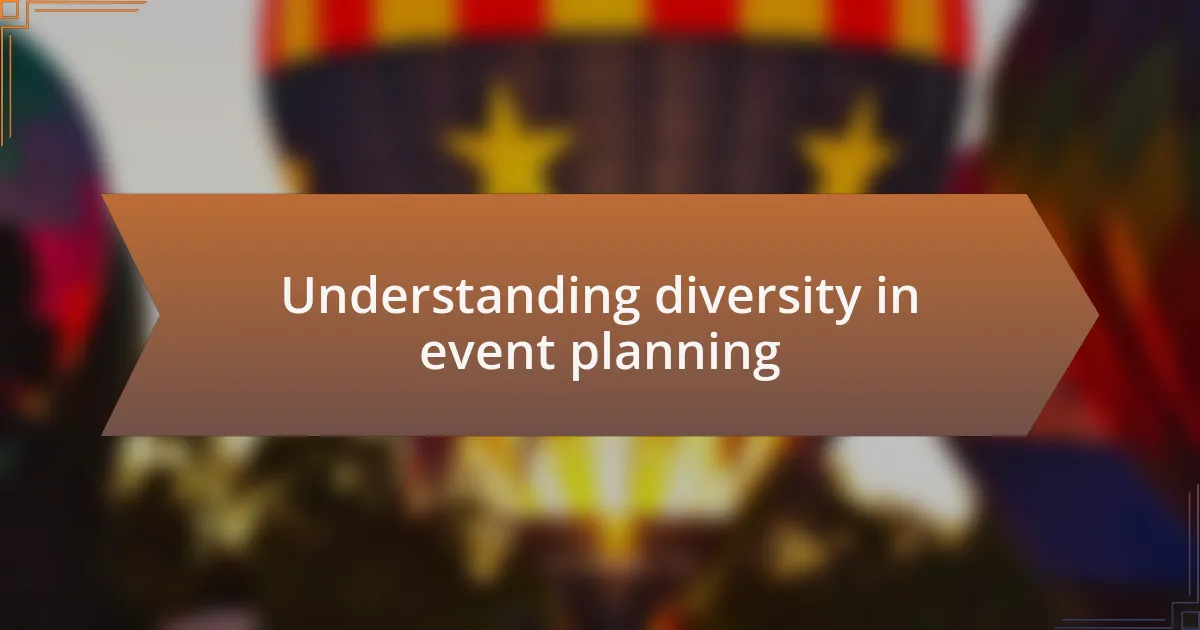
Understanding diversity in event planning
Diversity in event planning isn’t just a buzzword; it’s a fundamental principle that creates vibrant and inclusive experiences. I recall organizing a community festival where the diverse cultural backgrounds of attendees enriched the overall atmosphere. The food, music, and performances reflected a mosaic of traditions, illustrating how inclusivity can elevate an event’s impact.
Have you ever thought about how diverse representation on an event team can influence the creative process? I know from experience that when people with different backgrounds contribute their perspectives, it leads to innovative solutions and ideas. This variety often results in themes and activities that resonate deeply with a broader audience.
It’s in these unique moments that I’ve seen firsthand how understanding and embracing diversity can transform events. For instance, during a corporate retreat I managed, we intentionally included activities that celebrated different cultures, which sparked authentic conversations and connections among participants. This not only fostered a sense of belonging but also highlighted the value of diverse perspectives in creating meaningful experiences.
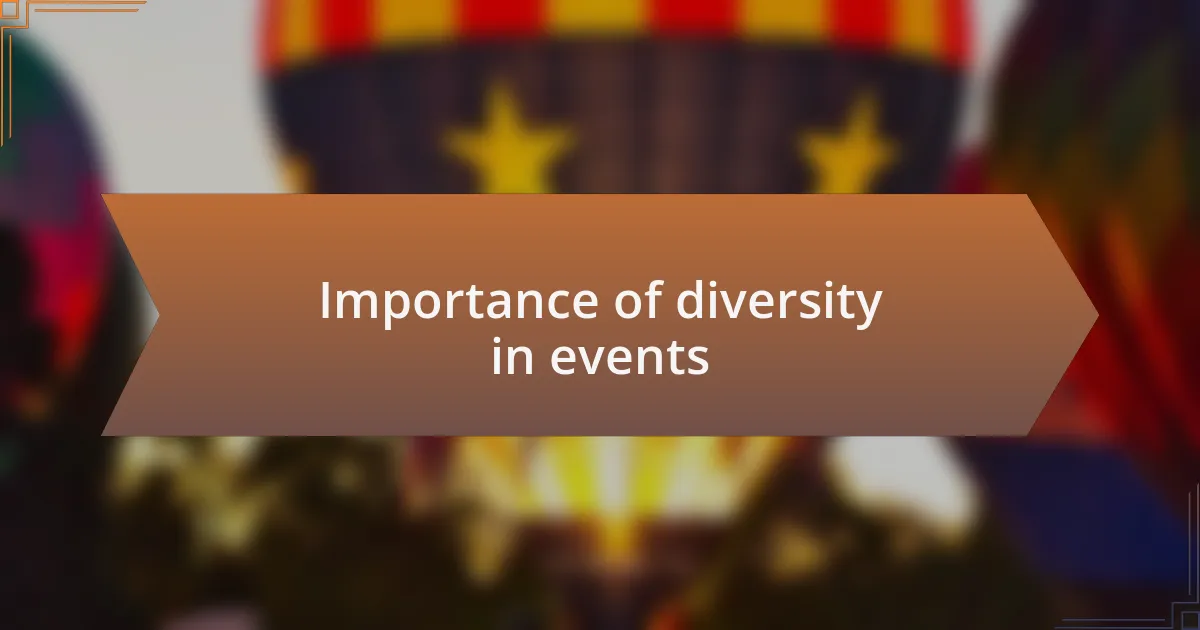
Importance of diversity in events
Diversity in events brings a wealth of perspectives that can dramatically enhance attendee engagement. I remember hosting a panel discussion where we invited speakers from various backgrounds. The richness of their experiences not only sparked lively debates but also fostered a sense of community among audience members. How often do we miss out on profound insights simply because we don’t embrace differing viewpoints?
I’ve often found that when events celebrate diversity, they create a safe space for attendees to share their stories. For example, during a multicultural workshop, I observed how participants opened up about their unique challenges and triumphs. This sharing led to powerful connections, making the event not just a series of activities, but a transformative experience. Is there anything more rewarding than witnessing people bond over shared experiences and newfound understanding?
Inclusivity is crucial, especially in today’s globalized world. One time, while planning a charity gala, I was struck by how the inclusion of diverse entertainment choices attracted a wider audience and raised more donations. It was a win-win scenario, demonstrating that the importance of diversity in events extends beyond just representation; it can also drive success and impact. Isn’t it fascinating how embracing diversity can lead to tangible benefits while enriching the event experience for all?
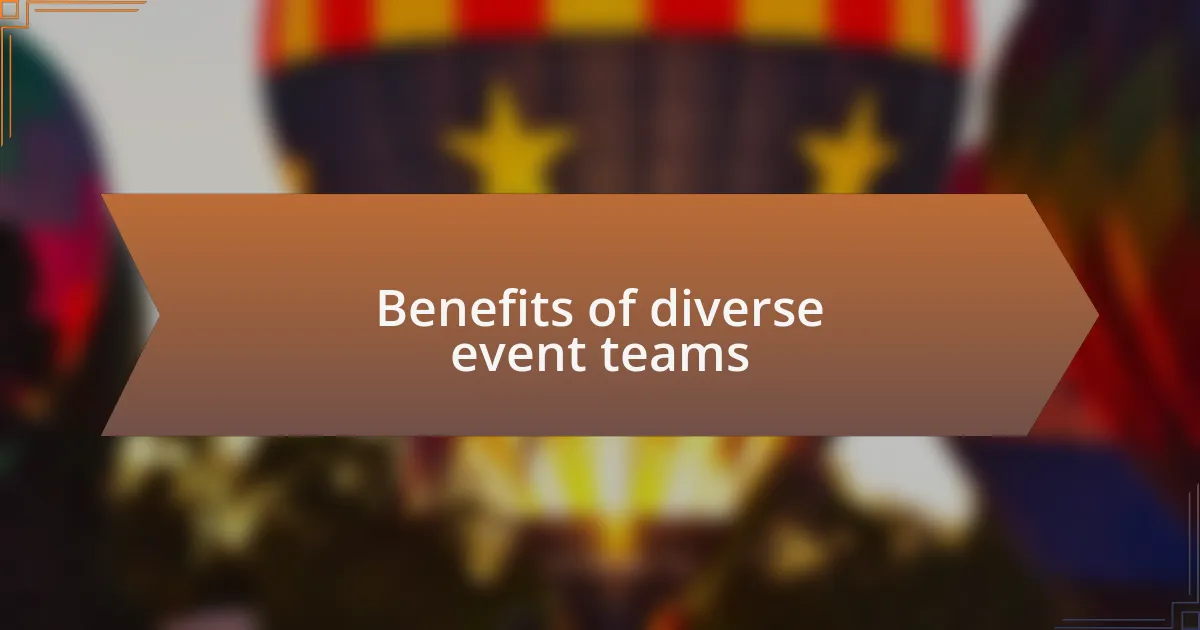
Benefits of diverse event teams
When I led a team composed of individuals from various cultural backgrounds for an international conference, I witnessed firsthand the creative synergy that emerged. Each member brought unique ideas that resonated with different audience segments, ultimately enhancing the event’s appeal. Isn’t it remarkable how a blend of perspectives can lead to innovative solutions that one homogenous team might overlook?
I remember organizing a local festival where a diverse team collaborated to plan activities that catered to various age groups and interests. The result was a dynamic program that drew in attendees who felt represented and included. Seeing families enjoying different cultural showcases was a vivid reminder of how diversity not only enriches content but galvanizes community spirit. Aren’t shared experiences like these what bring people together?
Reflecting on one of my events, I realized the power of representation in marketing materials too. We featured diverse voices in our promotional campaigns, which led to increased engagement on social media and higher ticket sales. It struck me how essential it is for attendees to see themselves in the experiences we promote. Don’t you think that when people feel represented, they are more likely to invest their time and resources?
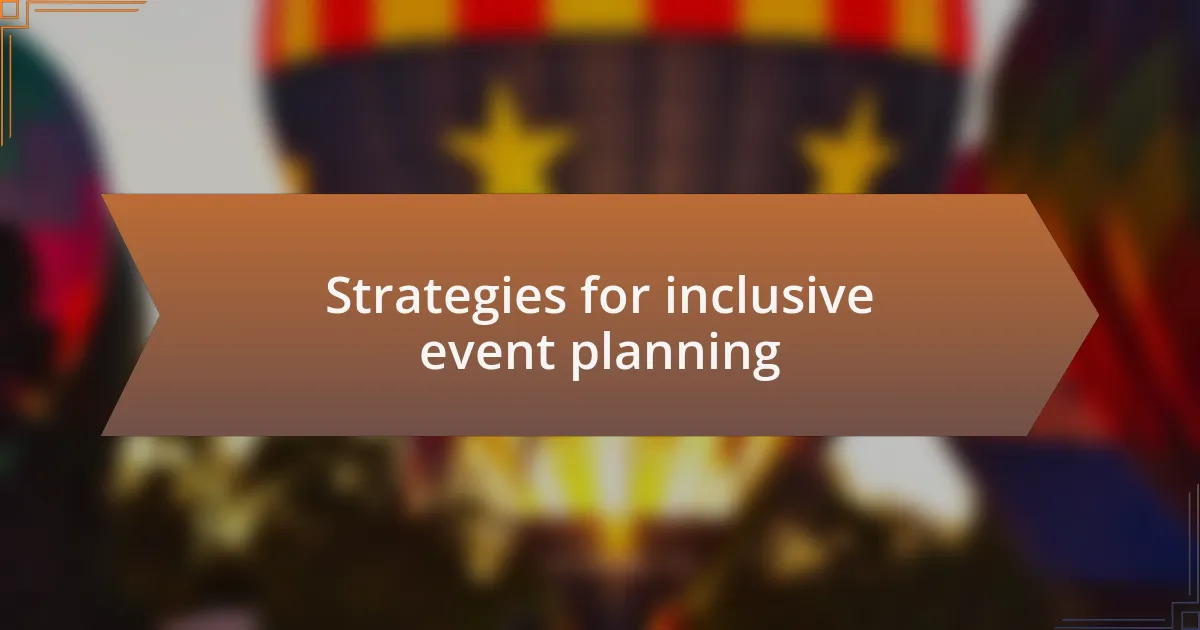
Strategies for inclusive event planning
Planning an inclusive event starts with actively seeking input from diverse communities. When I was tasked with organizing a workshop for aspiring entrepreneurs, I consulted with several local groups. Their insights not only guided the content but also shaped the event’s format, making participants feel valued and understood. How often do we overlook the importance of listening to those we aim to serve?
Accessibility is another key strategy that I prioritize. In one particular event, we ensured that the venue was wheelchair accessible and provided sign language interpreters for sessions. Seeing the gratitude in attendees’ expressions when their needs were met was incredibly rewarding. It made me realize that small adjustments can create a ripple effect, inviting a broader audience to engage in meaningful ways.
Creating a welcoming environment goes beyond logistics. I once organized a networking event that featured diverse speakers who shared their journeys. The atmosphere was charged with energy, as attendees connected over shared experiences and learned from different paths. Don’t you think fostering these authentic connections is what truly makes an event memorable?
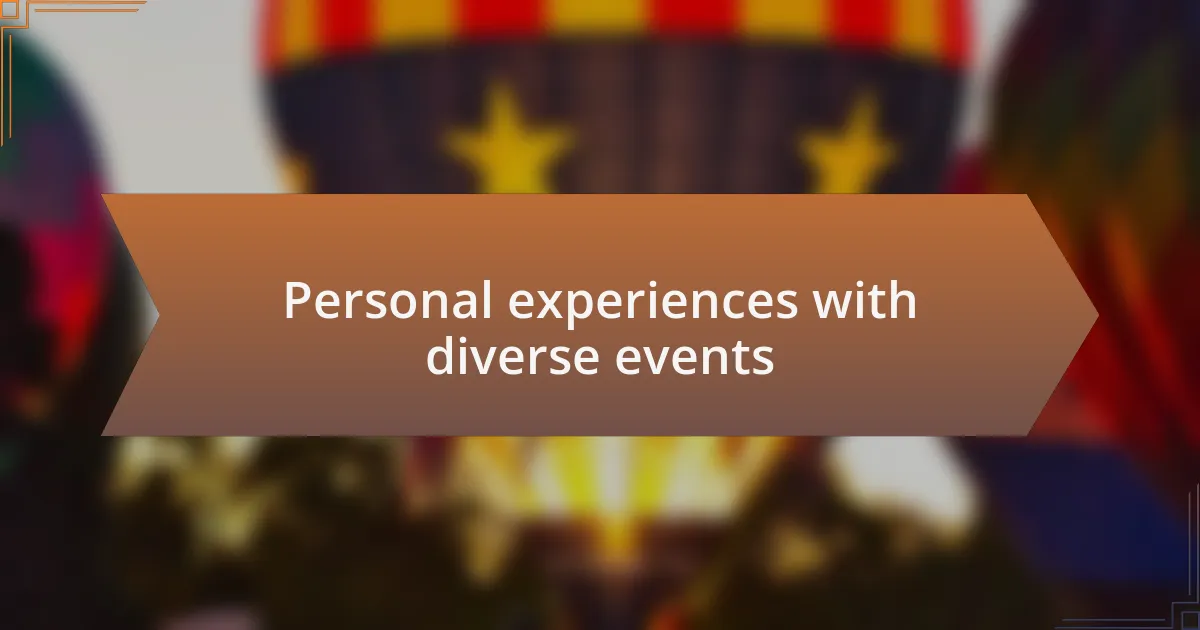
Personal experiences with diverse events
I recall a vibrant cultural festival I organized that showcased the culinary traditions of various communities. Each dish represented more than just food; it was a story, a heritage. The joy on people’s faces as they tasted different cuisines reminded me that food has a unique power to bring people together, transcending language and background. Have you ever experienced that feeling of unity over a shared meal?
Another memorable event was a panel discussion aimed at bridging generational gaps in business. We invited speakers from different age groups, each offering a unique perspective. I was fascinated by how the audience engaged, asking questions that spanned both nostalgia and forward-thinking ideas. This taught me that diversity in thought not only enriches dialogue but can lead to innovative solutions. It’s made me wonder: what valuable insights might we miss if we don’t diversify our panels?
While working on a charity gala, I made it a point to highlight voices from underrepresented communities. One participant shared their inspirational story, moving many attendees to tears and enlightening others about the challenges faced in their community. The palpable emotion in the room was a powerful reminder of our shared humanity. Isn’t it incredible how diverse narratives can drive empathy and understanding during a single event?
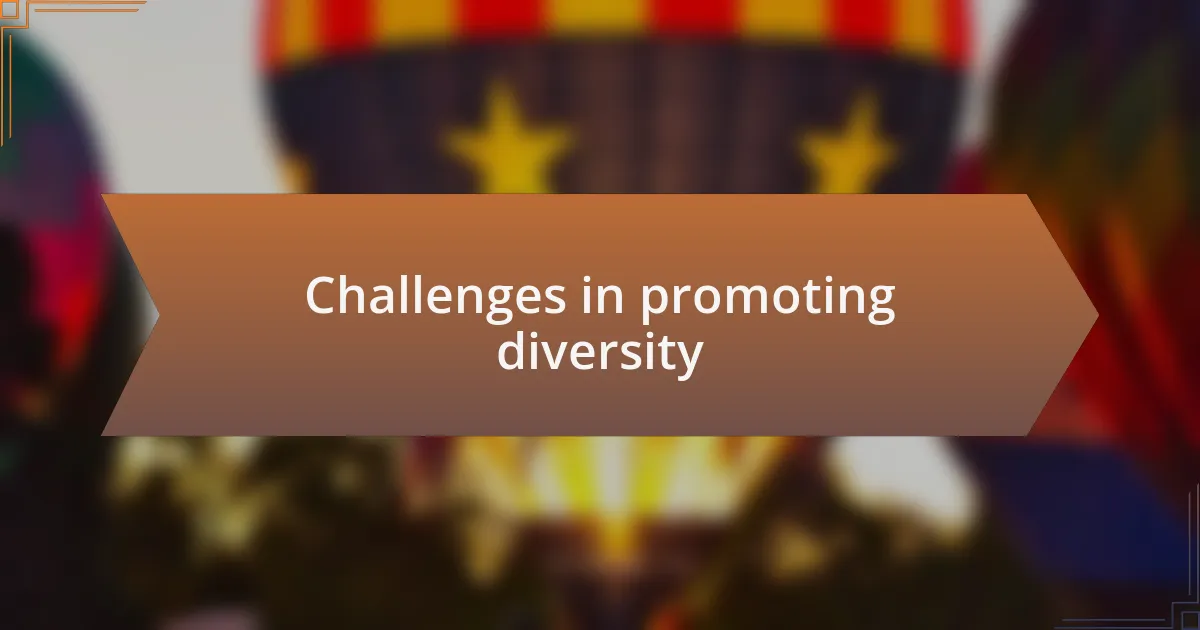
Challenges in promoting diversity
One significant challenge in promoting diversity within event planning is the tendency to unconsciously favor familiar networks and contacts. I’ve noticed that it’s often easier to collaborate with those we already know, which creates a cycle that excludes diverse voices. Have you ever found yourself relying on the same group of people, even when there are many brilliant options out there waiting to be discovered?
Another challenge I’ve encountered revolves around budget constraints. Limited funds can restrict our ability to book diverse speakers or performers who might come from backgrounds that require additional funding or support. It’s a frustrating reality that makes me question how we can leverage creativity to stretch those budgets while ensuring we don’t compromise on diversity.
Time can also act as a barrier. My experience has shown that people can underestimate the time needed to build relationships with diverse communities. When deadlines approach, it’s easy to revert to what’s familiar instead of taking that necessary time to connect and collaborate. How do we prioritize patience and understanding in our fast-paced environment? I believe this is crucial for fostering authentic relationships that enrich our events.